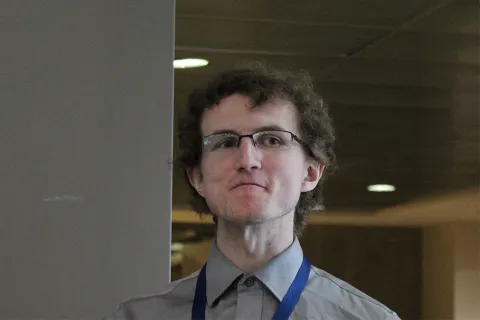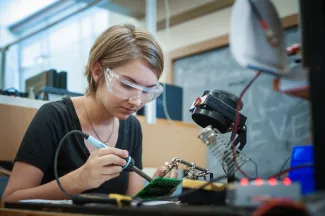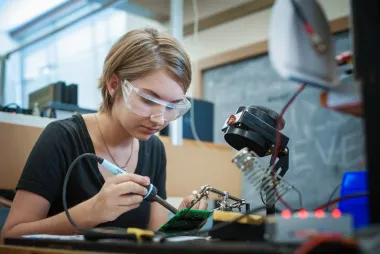"Challenges are just opportunities to build character."

Ben Wiltshire
- Degree:
- Doctor of Philosophy
- Grad year: 2022
- Program:
- Campus: Okanagan
I am a PhD student from University of British Columbia – Okanagan campus. During my studies I had the chance to learn, develop, travel, and present my research on microwave sensing technology to a wide audience. I grew up in Edmonton, Alberta and studied physics and electrical engineering during my BSc and MSc at the University of Alberta.
Why did you choose to go into your field of study at UBC?
Choosing UBC was a simple decision for me, a world-renown learning institution with a growing campus and an opportunity to work on high-demand technological projects. When my professor Dr. Zarifi started here and wanted to set up a world-leading radio and microwave-frequency laboratory I truly believed we could do it. The addition of a beach and ski-hill within an hour’s drive really helped as well.
What has made your time at UBC memorable?
The things I’ll remember most fondly are the friends I met at UBC. I think no one succeeds at a multi-year degree on their own, and having a group of people that support me and help me grow as a person was really important to me because the PhD path is rocky and bumpy and never quite how you pictured it when you started. Definitely memories of time spent with friends will outlast any of the technical details I learned in research or classes, and it’s nice to be able to share accomplishments with people close to you.
Tell us about your experience in your program. What have you learned that is most valuable?
I had a great experience in my program because I got to start at the very beginning. One of my first jobs in the lab was going on a trip to Home Depot to pick up tools, benches, and other lab supplies, and then assembling them back in our small closet space so that we could run experiments. By the end of my degree, we had multiple labs for chemical processing and antenna analysis, as well as about 15 more students. I think throughout my time here one thing I always tried to do was seek out challenges as learning opportunities, because in doing new things you improve upon what you already knew - and that sort of builds up to a point where you can do some really cool science.
How are you applying the skills you learned through your studies at UBC?
Right now, I am working with a technology company hoping to change the way we build microchips – so skills like coding, experimental design, data analysis, and critical thinking are critical to accomplish most tasks. There’s also a ton of value in interpersonal communication and time management which is a great skill to learn as a student if you’re lucky enough to work in teams or on big projects. I think one underrated skill that’s important to have is to not be afraid of failure, so that you can face new challenges head on and believe that you’ll overcome them – there was sort of a belief in our group that if something could be done, there was no reason why we couldn’t be the ones to do it – and I think that mindset has sort of stuck with me and given me confidence in my new career.
How did your studies in the Faculty of Applied Science prepare you for the future of work?
In general, flexibility is key. We might not know what jobs will be like in 10 years, but on a shorter scale – a lot of graduates don’t know what interview is going to lead to a callback, or what LinkedIn recruiter might message them next, so it’s important to be ready for anything and believe in yourself. It’s pretty rare to land a job in your exact academic field (I didn’t), but if you work hard and you aren’t afraid to jump into something that seems new then success, however you measure it, will come to you eventually.


